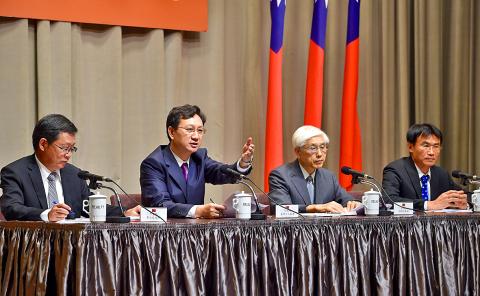The Executive Yuan yesterday responded at a news conference to the three demands listed by the Chinese Nationalist Party (KMT) caucus during its protest at the Legislative Yuan in Taipei on Tuesday: for the Cabinet to reject ractopamine-laced US pork, to reject Japanese food products from radiation-affected regions and to protect fishermen’s rights in the disputed waters near the Okinotori atoll.
The KMT caucus blocked Premier Lin Chuan (林全) from presenting his policy platform to the legislature on Tuesday, while demanding that the premier sign a pledge concerning the above-mentioned issues.
The Executive Yuan’s news conference was attended by officials from the three relevant agencies — the Ministry of Health and Welfare, the Ministry of Foreign Affairs and the Council of Agriculture (COA) — in response to the KMT’s calls.

Photo: Lo Pei-der, Taipei Times
Executive Yuan spokesperson Tung Chen-yuan (童振源) said the government has a “clear attitude” on its determination to safeguard food safety, to which issues regarding US pork and Japanese food products from the radiation-affected regions are related.
Tung said the government would faithfully play the role of a gatekeeper when it comes to food safety, “which requires expertise and scientific evaluation.”
He said that the need to join the Trans-Pacific Partnership trade pact is “a consensus among the people and between the ruling and opposition parties,” and the government would advance the plan “under the premise that both food safety and the nation’s pig farmers’ rights are secured.”
COA Deputy Minister Chen Chi-chung (陳吉仲) said the government has drawn up plans “to establish brands for domestically produced pork to protect domestic pig farmers’ earnings; to rigorously implement the regulations governing the labeling of the pork production to distinguish what is domestically produced from what is not; to carry out risk evaluation and refuse the import of ractopamine-laced pork until a scientific and evidence-based evaluation takes place; and to establish a comprehensive communication mechanism to undergo talks with farmers, consumers and civic groups.”
Minister of Health and Welfare Lin Tzou-yien (林奏延) also referred to scientific evidence “in line with international regulations” as “the grounds for the government’s food safety management.”
“So far, there are no plans to relax the restrictions on the import of Japanese food products from radiation-affected regions,” Lin said, adding that the government would continue to watch closely the related examinations in Japan and other countries’ regulations and test results concerning Japanese foodstuffs.
Vice Minister of Foreign Affairs Leo Lee (李澄然) said Taiwan has always maintained that maritime disputes should be resolved peacefully through international arbitration or negotiations among all the parties concerned, in line with international law, reiterating that until there is a ruling on the legal status of Okinotori, Japan should respect the rights of Taiwan and other nations to fish and freely navigate the area.
“The sea near Okinotori is in dispute, but the government’s resolve to safeguard fishermen’s rights will not change,” Lee said, adding that a mechanism for dialogue on Taiwan-Japan cooperation in the oceanic economy would be launched next month.
“Only through diplomatic negotiations can [disputes] be solved satisfactorily and our fishermen’s rights be secured,” Lee said.
“Unilateral declarations would continue to stir up conflicts and would not protect our fishermen’s rights,” Tung added.

NATIONAL SECURITY THREAT: An official said that Guan Guan’s comments had gone beyond the threshold of free speech, as she advocated for the destruction of the ROC China-born media influencer Guan Guan’s (關關) residency permit has been revoked for repeatedly posting pro-China content that threatens national security, the National Immigration Agency said yesterday. Guan Guan has said many controversial things in her videos posted to Douyin (抖音), including “the red flag will soon be painted all over Taiwan” and “Taiwan is an inseparable part of China,” while expressing hope for expedited “reunification.” The agency received multiple reports alleging that Guan Guan had advocated for armed reunification last year. After investigating, the agency last month issued a notice requiring her to appear and account for her actions. Guan Guan appeared as required,

Japan and the Philippines yesterday signed a defense pact that would allow the tax-free provision of ammunition, fuel, food and other necessities when their forces stage joint training to boost deterrence against China’s growing aggression in the region and to bolster their preparation for natural disasters. Japan has faced increasing political, trade and security tensions with China, which was angered by Japanese Prime Minister Sanae Takaichi’s remark that a Chinese attack on Taiwan would be a survival-threatening situation for Japan, triggering a military response. Japan and the Philippines have also had separate territorial conflicts with Beijing in the East and South China

A strong cold air mass is expected to arrive tonight, bringing a change in weather and a drop in temperature, the Central Weather Administration (CWA) said. The coldest time would be early on Thursday morning, with temperatures in some areas dipping as low as 8°C, it said. Daytime highs yesterday were 22°C to 24°C in northern and eastern Taiwan, and about 25°C to 28°C in the central and southern regions, it said. However, nighttime lows would dip to about 15°C to 16°C in central and northern Taiwan as well as the northeast, and 17°C to 19°C elsewhere, it said. Tropical Storm Nokaen, currently

PAPERS, PLEASE: The gang exploited the high value of the passports, selling them at inflated prices to Chinese buyers, who would treat them as ‘invisibility cloaks’ The Yilan District Court has handed four members of a syndicate prison terms ranging from one year and two months to two years and two months for their involvement in a scheme to purchase Taiwanese passports and resell them abroad at a massive markup. A Chinese human smuggling syndicate purchased Taiwanese passports through local criminal networks, exploiting the passports’ visa-free travel privileges to turn a profit of more than 20 times the original price, the court said. Such criminal organizations enable people to impersonate Taiwanese when entering and exiting Taiwan and other countries, undermining social order and the credibility of the nation’s